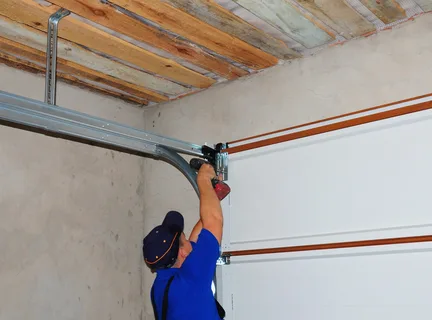DIY Garage Door Installation: Risks, Rewards, and When to Call a Professional!
- Admin

- Apr 7, 2025
- 3 min read
Garage doors are not just a convenience; they're an essential safety and security aspect of your home. A DIY installation attempt can be extremely dangerous if not done properly. From the door's sheer weight to the complex spring systems, there are many chances for harm and damage. This manual will examine the possibility of pitfalls from DIY garage door installation, identify the advantages of professional support, and assist you in assessing whether you are qualified for the job.
What is DIY Garage Door Installation?
Garage door installation is a multi-step process, ranging from site preparation to door assembly and hanging. Although DIY jobs are economical, they also carry risks like safety risks and improper installation, which can result in operational problems.
What Are the Risks of DIY Garage Door Installation?
Safety Hazards: Garage doors are heavy and may seriously injure you if they fall during installation. Torsion springs are especially hazardous and must be handled with caution.
Structural Damage: Poor installation may result in misaligned tracks, making the door bind or fall off the tracks, damaging the door or adjacent structure.
Voiding of Warranty: Poor installation may void the manufacturer's warranty and result in expensive repairs in the future.
What Are the Benefits of DIY Garage Door Installation?
Cost Savings: You can save on labor costs by doing it yourself.
Learning Experience: Having a DIY experience can be rewarding and educational.
Customisation: You are in complete control of the installation process, so you can customise it to suit your particular requirements.
How Do I Know When to Call a Professional?
Complexity: If you are working with complicated systems such as torsion springs or if the door is large and heavy, it's advisable to consult the experts.
Lack of Experience: If you're not sure about any aspect of the work, having professionals do it guarantees quality and safety.
Time Constraints: If you don't have time or don't want to waste your weekend on a DIY job, professionals will get the job done effectively.
Tips for Successful DIY Installation
Follow Instructions: Refer to the manufacturer's instructions and any guides available to guarantee correct installation.
Prepare Properly: Have all the tools and materials ready before beginning.
Test the Door: After installation, test the door several times to guarantee smooth operation and safety.
What tools are essential for a successful garage door installation?
Basic Tools
Adjustable Wrench and Socket Set: These are essentials for bolt and nut removal and installation on the door tracks and opener.
Screwdrivers (Flathead and Phillips): used for holding hinges, motor screw removal, and putting together different parts.
Drill and Bits: A power drill is a must for hole drilling and screw driving for bracket mounting.
Tape Measure and Level: These are used to make sure there are proper measurements and correct track and bracket alignment.
Hammer: Can be used to tap parts into position and hold them in place.
Specialised Tools
Winding bars: These are specifically used for carefully handling and tensioning torsion springs.
Locking Pliers: Assists in holding the door in place while repairing springs, making the work safe and efficient.
Impact wrench: Suitable for tightening bolts in torsion springs and general heavy-duty use.
Safety Gear
Safety Glasses: Protect your eyes from tools and debris
Leather gloves: Protect your hands from abrasions and cuts.
Sturdy Footwear: Avoids slipping and falling on installation.
Additional Equipment
Ladders: Two ladders are ideal for reaching high points safely.
Cordless Drill: Handy for holding brackets and fasteners without being held back by a power source.
Conclusion
Garage door installation can be a worthwhile DIY venture, but it is important to balance the risks and rewards. If you still choose to go with DIY, be sure to observe safety procedures and manufacturer instructions very closely. Yet, in case you're uncertain or encounter intricate situations, having a professional handle it is the safest and most trustworthy alternative.









Comments